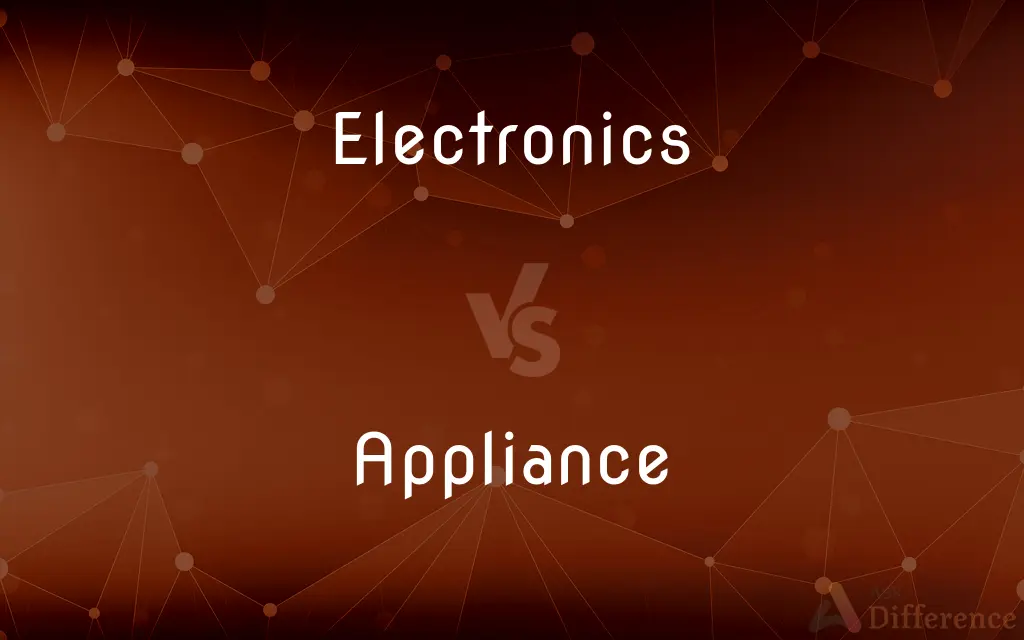Electronics vs. Appliance — What's the Difference?
Edited by Tayyaba Rehman — By Fiza Rafique — Updated on March 9, 2024
Electronics refer to devices using electrical circuits, focusing on functionalities like computing or communication, while appliances are larger, often household items designed for specific tasks like cooking or cleaning.

Difference Between Electronics and Appliance
Table of Contents
ADVERTISEMENT
Key Differences
Electronics encompass a wide range of devices that operate through the manipulation of electrical currents and signals, often associated with computing, entertainment, and communication. Appliances, whereas, are typically larger, more practical items intended for routine tasks in homes and businesses, such as refrigeration, cooking, and cleaning.
The primary distinction lies in their use and complexity; electronics are usually more complex, involving integrated circuits and software to perform various functions. On the other hand, appliances are generally simpler, designed for specific practical tasks with a focus on durability and user-friendliness.
While the development of electronics has been propelled by advances in technology, leading to miniaturization and increased capabilities, appliances have evolved to become more energy-efficient and user-friendly, often incorporating electronic components to enhance their functionality.
Electronics are characterized by their portability and versatility, with examples ranging from smartphones to laptops. Appliances, however, are mostly stationary and serve essential domestic roles, including refrigerators and washing machines.
This distinction also extends to their economic impact; electronics have fueled the growth of the tech industry, driving innovation and connectivity. Appliances contribute to quality of life and efficiency in household and commercial settings, with advancements focusing on sustainability and energy savings.
ADVERTISEMENT
Comparison Chart
Purpose
Perform complex functions like computing or communication.
Designed for specific practical tasks like cooking or cleaning.
Complexity
High, with integrated circuits and software.
Lower, focused on durability and user-friendliness.
Evolution
Driven by technological advances, miniaturization.
Evolved towards energy efficiency, often integrating electronics.
Examples
Smartphones, laptops.
Refrigerators, washing machines.
Economic Impact
Fuels tech industry growth, innovation.
Contributes to quality of life, efficiency, with a focus on sustainability.
Compare with Definitions
Electronics
Devices operating with electrical circuits for varied functions.
The smartphone is a versatile electronic device.
Appliance
Household items for specific tasks, enhancing living standards.
The dishwasher has made cleaning up after meals much easier.
Electronics
Driving forces in the entertainment industry.
Gaming consoles and streaming devices have transformed leisure activities.
Appliance
Evolving with technology to incorporate smart features.
Smart refrigerators can track expiration dates and grocery lists.
Electronics
Characterized by portability and technological innovation.
Wearable electronics like smartwatches are gaining popularity.
Appliance
Focused on energy efficiency and user convenience.
Modern appliances are designed to reduce electricity and water usage.
Electronics
Integral to modern communication systems.
Radios and televisions revolutionized information dissemination.
Appliance
Often larger, stationary items in homes and businesses.
Industrial washing machines are essential in laundromats.
Electronics
Essential for computing and data processing.
Computers and tablets are ubiquitous in workplaces and homes.
Appliance
Integral to food preparation and storage.
Microwaves and refrigerators are staples in modern kitchens.
Electronics
Electronics comprises the physics, engineering, technology and applications that deal with the emission, flow and control of electrons in vacuum and matter. It uses active devices to control electron flow by amplification and rectification, which distinguishes it from classical electrical engineering which uses passive effects such as resistance, capacitance and inductance to control current flow.
Appliance
A device or piece of equipment designed to perform a specific task
Electrical and gas appliances
Electronics
(used with a sing. verb) The science and technology of electronic phenomena.
Appliance
A fire engine
Three fire appliances were rushed to the scene
One appliance attended the fire
Electronics
(used with a pl. verb) Electronic devices and systems
The electronics aboard the new aircraft are very sophisticated.
Appliance
The action or process of bringing something into operation
The appliance of science could increase crop yields
Electronics
(physics) The study and use of electrical devices that operate by controlling the flow of electrons or other electrically charged particles or by converting the flow of charged particles to or from other forms of energy.
Electronics is a popular subject.
Appliance
A device or instrument designed to perform a specific function, especially an electrical device, such as a toaster, for household use
A store that sells the newest kitchen appliances.
Electronics
(in the plural) A device or devices which require the flow of electrons through conductors and semiconductors in order to perform their function; devices that operate on electrical power (battery or outlet)
Appliance
A dental or surgical device designed to perform a therapeutic or corrective function.
Electronics
Electronic circuitry.
The electronics is the difference between a modern and an old-fashion thermostat.
The electronics are completely updated.
Appliance
An implement, an instrument or apparatus designed (or at least used) as a means to a specific end, especially:
Electronics
The branch of physics that deals with the behavior of electrons. Electronics is primarily concerned with phenomena other than simple conduction, such as emission of electrons, storage of electrical charge, the effects of electrical fields on the conduction of electrons through a circuit, and amplification and manipulation of electric signals such as voltage or current by design of circuits. Electronics also encompasses the application of such fundamental principles to the construction of devices using the manipulation of electrons in their operation, known as electronic devices.
Appliance
A non-manual apparatus or device, powered electrically or by another small motor, used in homes to perform domestic functions (household appliance) and/or in offices.
Many house fires are caused by faulty appliances, such as refrigerators, washing machines and dryers.
Electronics
The branch of engineering concerned with design of devices using the principles of electronics, for practical purposes.
Appliance
An attachment, a piece of equipment to adapt another tool or machine to a specific purpose.
Electronics
Electronic devices generally, or the electronic circuits within an electronic device.
Appliance
(obsolete) The act of applying.
Electronics
The branch of physics that deals with the emission and effects of electrons and with the use of electronic devices
Appliance
(obsolete) A means of eliminating or counteracting something undesirable, especially an illness.
Appliance
Willing service, willingness to act as someone wishes.
Appliance
The act of applying; application.
Appliance
Subservience; compliance.
Appliance
A thing applied or used as a means to an end; an apparatus or device; as, to use various appliances; a mechanical appliance; a machine with its appliances.
Appliance
An apparatus or device, usually powered electrically, used in homes to perform domestic functions. An appliance is often categorized as a major appliance or a minor appliance by its cost. Common major appliances are the refrigerator, washing machine, clothes drier, oven, and dishwasher. Some minor appliances are a toaster, vacuum cleaner or microwave oven.
Appliance
A device that is very useful for a particular job
Appliance
Durable goods for home or office use
Common Curiosities
Can an item be both an electronic and an appliance?
Yes, some modern appliances integrate electronic components for smarter functionality, blurring the lines between the two categories.
What is considered an appliance?
An appliance is a device designed for a specific practical task, usually related to cooking, cleaning, or other household activities, often larger and stationary.
What is the impact of smart features in appliances?
Smart features in appliances offer enhanced convenience, efficiency, and control, allowing for remote operation and monitoring, and even energy savings.
How do appliances contribute to energy efficiency?
Modern appliances are designed to use less electricity and water, contributing to environmental sustainability and reducing utility bills.
How does technology influence the development of appliances?
Technology influences appliances by introducing smart functionality, improving energy efficiency, and enhancing user interfaces for better convenience.
What role do appliances play in modern homes?
Appliances play a crucial role in enhancing living standards by simplifying tasks, improving food preservation, and ensuring cleanliness and comfort.
How do electronics and appliances differ in terms of repairability?
Electronics tend to be more challenging to repair due to their complexity and miniaturization, while appliances may be easier to service due to their simpler, more robust design.
What's the significance of portability in electronics?
Portability allows electronics to be easily carried and used on the go, increasing their utility and integrating them into daily life.
What defines an electronic device?
An electronic device is characterized by its use of electrical circuits and components to perform functions such as computing, communication, or entertainment.
How have electronics changed the way we communicate?
Electronics like smartphones and computers have revolutionized communication, enabling instant connectivity and access to information worldwide.
Why is durability important for appliances?
Durability ensures that appliances can withstand regular use over time, offering reliability and reducing the need for frequent replacements.
What are the environmental implications of electronics?
Electronics pose environmental challenges regarding energy use and electronic waste, prompting initiatives for recycling and sustainable design.
What's the future of electronics and appliances?
The future points towards further integration of smart technologies, with electronics and appliances becoming more interconnected, energy-efficient, and tailored to user needs.
How has the consumer preference for electronics and appliances evolved?
Consumer preferences have shifted towards devices and appliances that offer convenience, connectivity, and sustainability, reflecting a broader trend towards smart and efficient homes.
Can the integration of electronics in appliances make them less durable?
The integration of electronics in appliances can introduce complexities that might affect durability, but advancements in design aim to mitigate these issues.
Share Your Discovery

Previous Comparison
Eager vs. Passionate
Next Comparison
Butlerage vs. WineAuthor Spotlight
Written by
Fiza RafiqueFiza Rafique is a skilled content writer at AskDifference.com, where she meticulously refines and enhances written pieces. Drawing from her vast editorial expertise, Fiza ensures clarity, accuracy, and precision in every article. Passionate about language, she continually seeks to elevate the quality of content for readers worldwide.
Edited by
Tayyaba RehmanTayyaba Rehman is a distinguished writer, currently serving as a primary contributor to askdifference.com. As a researcher in semantics and etymology, Tayyaba's passion for the complexity of languages and their distinctions has found a perfect home on the platform. Tayyaba delves into the intricacies of language, distinguishing between commonly confused words and phrases, thereby providing clarity for readers worldwide.















































